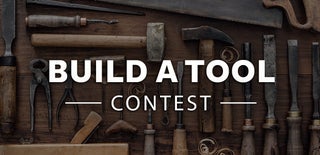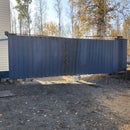Introduction: Workshop Table
There are a LOT of great Workshop Table examples and ideas on this site. I set out to make one that is strong, simple and easy to assemble. My goals for this build:
- sturdy
- top area 3ft x 8ft with an overhang
- bottom shelf that is removable
- wheels
- table height 3ft
Thanks for looking!
Step 1: Plan
I did a quick sketch to plan the position of supports. For the shelf, I wanted to be able to just lay a piece of wood down without having to fuss with it or notch it around the supports. By sandwiching the diagonals between 2x4s, it leaves a nice ledge for the shelf. Sandwiched 2x4s is overkill for this table but it provides a lot of surface for attaching the diagonals without the worry of cutting perfect angles. The leg-end diagonals turned out to be unnecessary. The vertical center support helps with the shelf and I like how it looks.
Step 2: Materials and Tools
Materials
- thick plywood
- misc dimensional lumber (2x4, 2x6, 2x12, 4x4)
- wheels
- screws
- metal brackets
- polyurethane
Tools
- saw
- clamps
- drill
- sander
- router
- painting supplies
Step 3: Assembly
When cutting the pieces, I spent more time ensuring similar items were cut to the same length instead of worrying about the exact length. The wheels ended up having a base that was larger than the 2x4/4x4 leg so I added a 2x6 to the bottom of the legs.
I assembled the legs first paying special attention to keeping the assembly square. After determining the center of the leg assembly width, I attached the center boards and then positioned the diagonal boards to match each other.
I used metal brackets to attach the top to the center boards so I wouldn't have to screw through the top.
Step 4: Detailing
I used a router to give the table top edge a rounded corner and spent more time sanding than I usually do. The additional sanding made the final surface very smooth. After several coats of poly, the project is complete.
Step 5: Part 2
After completing the table I wasn't happy about how the top was attached to the legs. I showed it to a friend who wanted one for his shop. So I made another table with a few minor changes:
- reversing the table leg orientation
- using 2x6 boards for the underside of the table top
- attach the table legs to the top without a bracket
- attach the lower center support to the bottom of the legs
- friend's last name starts with W so I modified the center support
Done...for now...

Participated in the
Build a Tool Contest













